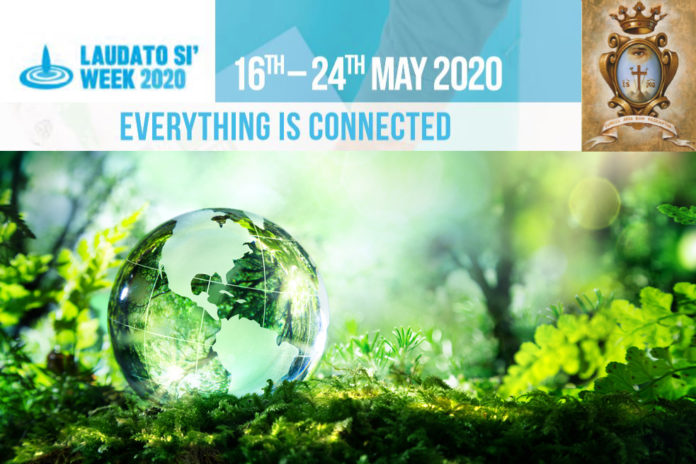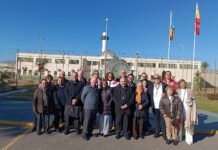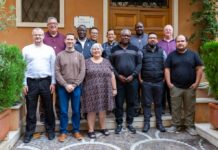Laudato Si Week 2020
Our Christian faith and our Redemptorist spirituality have been challenged in recent decades to respond to the ecological crisis. The promulgation of the Encyclical Laudato Si (LS), five years ago, marked a milestone in this ethical-spiritual journey that the Church has been maturing gradually. The fifth anniversary of its promulgation represents, for us, Redemptorists, the opportunity to respond to this call, which the last General Chapter also echoed. As the Encyclical points out, this is a spiritual challenge: “We lack an awareness of our common origin, of our mutual belonging, and a future to be shared with everyone. This basic awareness would enable the development of new convictions, attitudes, and forms of life. A great cultural, spiritual, and educational challenge stands before us, and it will demand that we set out on the long path of renewal” (LS 202).
For this reason, Pope Francis makes an urgent call “for a new dialogue about how we are shaping the future of our planet. We need a conversation which includes everyone, since the environmental challenge we are undergoing, and its human roots, concern and affects us all” (14). It is a call -in the words of the Pope- to ecological conversion.
 Redemptorist spirituality provides us with the basis that allows us to understand our mission and ourselves within this world. Number 217 of LS states: ” Living our vocation to be protectors of God’s handiwork is essential to a life of virtue; it is not an optional or a secondary aspect of our Christian experience”. Since there can be no sincere and authentic Christian spirituality today without a living awareness of the integrity of the earth, we Redemptorists are thus urged to incorporate this ecological awareness into the set of values that animate our way of life and our ministry.
Redemptorist spirituality provides us with the basis that allows us to understand our mission and ourselves within this world. Number 217 of LS states: ” Living our vocation to be protectors of God’s handiwork is essential to a life of virtue; it is not an optional or a secondary aspect of our Christian experience”. Since there can be no sincere and authentic Christian spirituality today without a living awareness of the integrity of the earth, we Redemptorists are thus urged to incorporate this ecological awareness into the set of values that animate our way of life and our ministry.
In the Redemptorist tradition, there is certainly a sufficient basis on which we can articulate the ecological dimension of our spirituality. One of the fundamental keys would undoubtedly be in the theology of the Incarnation or, more generally, in the theology of redemption, where the core of our spirituality lies. The 1998 Communicanda on Spirituality states that “our spirituality is rooted in the theology of the Incarnation” (24). Thus, if we recognize that our spirituality has a strong connection to the incarnate God, then we must be united to all of Creation, not only because of our chemical-physical ties but also because of our spiritual ties. Because in his Incarnation, Christ assumes not only “humanity” in its restricted sense, but also all created reality, which is also the object of redemption.
Noel Londoño CSsR states that “the Incarnation has been the basic dimension of the devotional liturgical and spiritual reflections of the Redemptorists” (Dictionary of Redemptorist Spirituality). Thus, during his life and after his death, both in Italy and abroad, Saint Alphonsus was considered an interpreter of popular piety, especially of the mystery of the Incarnation. Many of his writings reveal his deep sensitivity to this fundamental element of the Christian faith: the saving closeness of God in his Son Jesus Christ. Not surprisingly, for many years, these pious practices, and the emphasis on meditation on the Incarnation, especially during Advent and Christmas, have been firmly adopted within the life of every Redemptorist community. Such practices could be rehabilitated today, but this time linked to the reality of a wounded world crying out for redemption.
Perhaps this is the moment to recognize, within our theology and spirituality, the presence of “despotic anthropocentrism” (Cf. LS 68) that places the human being as the center and end of the work of redemption, ignoring that, within the causality and effect of the work of redemption, the whole of the created reality is also contained. Because “Human beings, endowed with intelligence and love, and drawn by the fullness of Christ, are called to lead all creatures back to their Creator” (LS 83).
Within our spirituality, Redemptorists recognize that we find God not only when we go out to meet him in a transcendental world that is beyond the material. Rather, the Christian insistence that, for example, St. Alphonsus reflects in his writings, is that God has already come to meet us out of love and that redemption occurs in our condition as creatures. St. Alphonsus’ Advent and Christmas meditations are precisely centered on a God made man who, out of love, enters human history to redeem all Creation from within. In this way, Alphonsian spirituality can help us recognize that we cannot know God outside the created world, within which the Incarnate Word is present.
For us as Redemptorists, the Incarnation of Christ is the archetype from which our ministry and our way of life are shaped. Noel Londoño affirms that the spirituality of Incarnation cannot be ethereal or disincarnate, nor can pastoral work be without soul, without prayer. Thus, a healthy theology of Incarnation and redemption must necessarily lead us to link the ecological issue, not so much because it is a “fashionable” topic, but because it is part of the voice of our collective consciousness that has come to recognize that redemption encompasses the entire realm of Creation.
On the other hand, the popular piety and Eucharistic tradition that we have inherited from St. Alphonsus cultivates an intimate, loving and close relationship with God manifested in the manger, on the cross and, in a special way, in the Eucharist. This relationship of closeness could lead us to analyze our relationship with Creation, based on what the Pope says: “Our relationship with the environment can never be isolated from our relationship with others and with God.” (LS 119). There are many who believe that the source of the ecological crisis is the disorder in this triple relationship between God, the human being, and the rest of Creation. Therefore, a re-establishment of relations with the Created must necessarily lead to a re-establishment of relations with God, or vice versa. From here, supported by the relational element of Alphonsian piety, we could re-imagine and re-establish a type of Eucharistic devotion that maintains this healthy balance of relations between the person, Creation, and the Creator.
In Laudato Si, it is clear that the ecological approach leads to the spiritual approach and vice versa. If the work of the Incarnation and the work of redemption embraces the whole of Creation, it is logical to deduce its “ecological” dimension and its impact on our spirituality, our ministry, and the reinterpretation of our way of life in the circumstances of today’s world. There can be no authentic or deep (Redemptorist or Christian) spirituality without a living awareness of the Earth and its integrity.
In this way, the ecological conversion of which Pope Francis speaks takes on enormous relevance for Redemptorists in today’s circumstances. We need to deepen our theology of the Incarnation so that it leads us to see the created world as a gift from God and not merely as a resource to be exploited. And the celebration of the fifth anniversary of the publication of Laudatus Si is a fitting occasion.
SM-JPIC General Commission
More information about Laudato Si’ Week can be found at https://laudatosiweek.org/. There will be several prayer experiences and important and exciting events posted online from May 16 to the 23rd. Topics include eco-spirituality, sustainability, advocacy, and social action.
Resource prepared by AMCF (Catholic Communication Centre)







